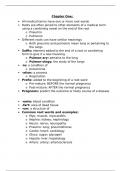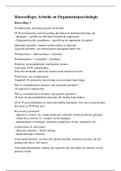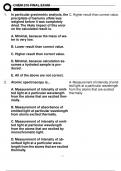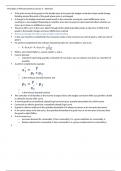1ST TOPIC- NEGATIVE, ANALOGICAL OR SYMBOLIC - POSSIBLE EXAM QUESTIONS
Asses the apophatic way (via negativa)
Asses the cataphatic way (via positiva)
‘G-d can be talked about symbolically’- how far do you agree?
Is symbolic language comprehensible
‘Analogy is more effective than symbol for talking about g-d’- asses this view
Does Tillich capture religious language better than the apophatic way?
Critically compare analogy and via negativa as methods of approaching religious language
Is g-d a symbol
Does Tillich get around the issues surrounding the cataphatic way?
, EVALUATE THE APOPHATIC WAY AS A METHOD OF SPEAKING ABOUT G-D (40)
INTRO:
What is the apophatic way- claims that because words are unable to adequately describe g-d, we can
only make statements about what he is not
- Supported by Pseudo Dionysius and Maimonides
- Positive sentences about g-d, such as “g-d is good” cannot be valid- describing g-d, and infinite
being with finite language
- By stating what g-d is not the Apophatic way is not denying an understanding of g-d but simply
denying the ability to express him through human language
My line of argument: the apophatic way is both biblically and logically incoherent- goes against the
positive descriptions of g-d in the bible and forces humans to distort their natural means- works in theory
but fails in everyday practice
, PARA 1: PSEUDO-DIONYSIUS
Against
- Claims that g-d is beyond description and human understanding- influenced by Plato
- This means that we are unable to talk about g-d in human terms- as he is “beyond every
assertion”- includes being above language itself
- Human language is constricted to our own temporal barriers and cannot be applied to g-d
- Langauge limits and misleads our understanding of g-d, as he is so different to humans- when we
talk about “g-d is good” we risk looking at his goodness in the same way as human goodness
- In this way, we can only talk about what g-d is not- in order to preserve his divinity
Supported:
- William james- speaking about g-d in terms of what he is not fits in with religious experiences-
ineffable- they cannot be described with ordinary language
- ‘the birth of g-d in the soul’
- This can be seen as a good thing- Ottos description of g-d as “wholly other”- via negativa is
recognises his qualities of transcendence and otherness, suggesting he is radically different to
anything else we understand and therefore cannot be described with human language
- In this way: good because it recognises g-ds transcendence and prevents giving him human
values which would question his power.
But- for
- Via negativa undermines the teachings of the bible, which often refer to g-d in human terms
- There are human depictions of g-d having a “face” and “walking” in the garden of Eden- through
via negativa these are too easily dismisses and regarded as metaphorical
- In the gospel of John- g-d is referred to positively- “g-d is love”
- G-d even describes himself in positive terms “I am the lord your g-d”- suggests that positive
language about g-d is acceptable
- Via negativa conflicts with language of the bible
- It may be argued that Christian’s should be able to know that the “goodness” used to describe g-
d is different to humans, don’t need to rule out language to accept that
So- Apophatic way does not work in this sense










